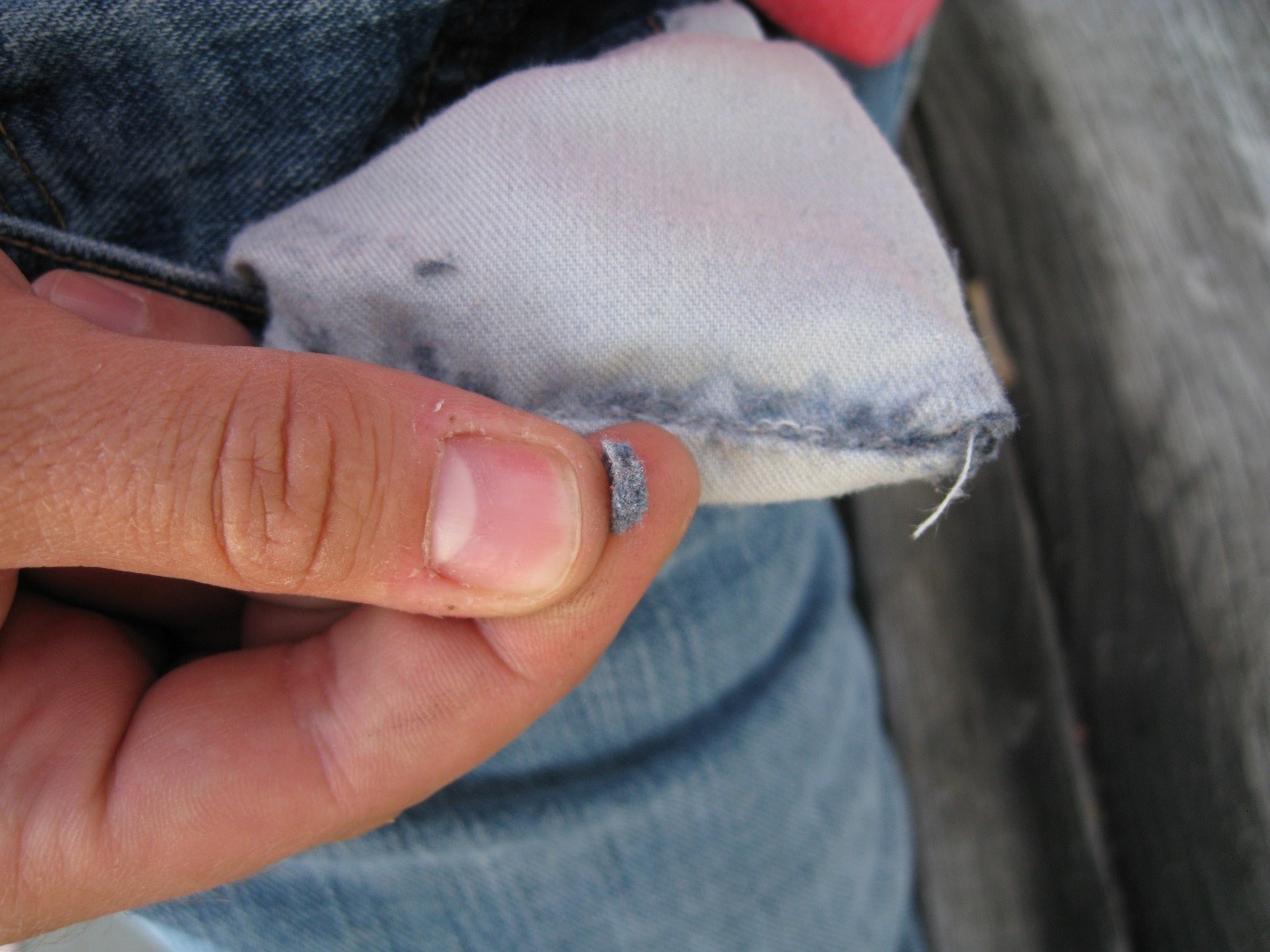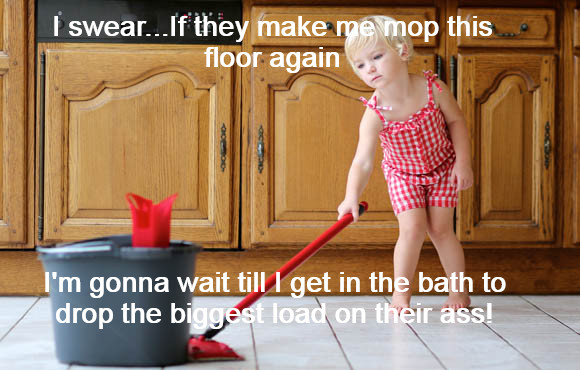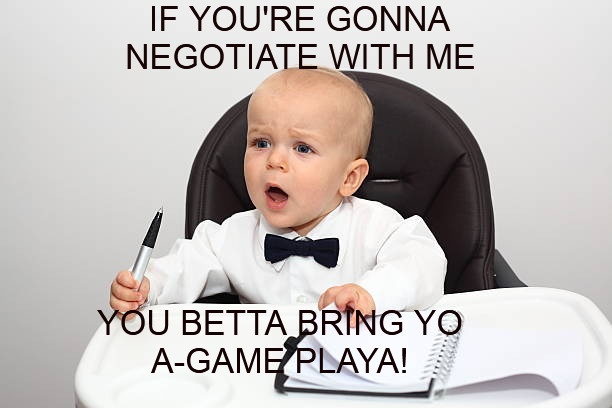Should You Give an Allowance or Pay Kids To Do Chores? – Pros and Cons
Is it me…or do kids these days seem to be waaay more spoiled than when we were growing up?
Whenever I talk to my other parent homies, the consensus seems to be that kids these days just don’t know how good they got it!
Like for real tho…
They don’t have a CLUE what it’s like to ….
Use dial-up internet and have your parents pick up the phone while you’re in the middle of downloading a song from Napster..and then have you gotta scream “I’m on the internet!”
Be on the phone with your friend, hear the line beep, press the button to switch to the other line, hear the person say “Can I speak to your dad please?”, click back over and tell your friend “I gotta go..it’s for my dad”, then click back over and tell the person “Hold on…I’ll get my dad” Then cover the phone with your hand as you yell “daaaaad….pick up the phoooone”
They don’t know what it’s like to rewind a cassette tape with a pencil because you didn’t want to waste the battery on your Sony Walkman rewinding the song.

And another thing we all agree on is that there was NOO way in hell we’d ever think about throwing a tantrum at home never less out in public because we didn’t get what we wanted.
Are you friggin kidding me?! Shooot…we knew if we did, either your mom or your dad would
Whoop
Yo
Ass!
And if you were out with your mom – that meant you’d get a double dose of whoop ass.
Once with your mom, and then a second one when you got home and your dad found out.
But nope..not these days.
Now, lemme be clear..I’m not condoning an old skool whooping but what I am sayin is that a lot of kids these days just seem to have no manners or appreciation for what they have.
They’re totally spoiled and feel like they are entitled to everything and anything.
I’m constantly seeing things like this when I scroll through social media:


And I’m like wtf?! What da hell is going on here? How are these spoiled little brats getting away with this? They just don’t know how good they have it.
They clearly don’t appreciate what they have.
They are obviously clueless about how hard their parents had to work to earn the money to buy these things for them.
And its reasons like this that parents want to start giving their kids money.
They want their kids to start learning how to manage their own money.
They want them to start learning the value of a dollar and start making their own decisions when it comes to making purchases.
But, at the same time …when parents start to think about giving their kids money, they also start to wonder – HOW?
How do I do it?
Should I just give them an allowance or pay them to do chores?
Well – in this guide, you’ll not only learn which method to use, but also 2 other secret methods that don’t get much attention that you may like better.
You’ll understand the mindset and reasons why some parents give an allowance vs make their kids earn money through doing chores.
You’ll also find out which method most parents are choosing and …
By the end, you’ll be able to figure out which method is best for you.
Now..lemme warn ya..before you get started – this guide is kinda long.
But trust me yo!…it’s jam packed with goodness.
It’s kinda like when you watched Avengers: Endgame for the first time.
It’s long, but at the end you’re like “Daayumm that movie was dope as hell!!”
Ok, so…before we get started, it’s important that you know the answer to this question:
Why do you want to give your kids money in the first place?
As parents, we each have our own individual reasons as to why we want to give our kids money.
And that’s fine.
See…these are YOUR kids.
So you get to decide what the reason is and why it’s important to YOU.
Maybe you don’t want your child to make the same mistakes you made with money.
Maybe you don’t want your child to become spoiled and grow up having a false sense of entitlement.
Maybe you want them to learn the value of dollar.
Or maybe… For once…you just want to be able to go to the store without your kids constantly nagging and asking you to buy them some dumb stupid toy that they just saw.
Whatever your reason is, it’s important that first, you know WHY and secondly, what values you want them to learn as a result.
Here are some questions to ask yourself to get you thinking:
- What money values do I want my kids to have?
- What do I want my child to learn and know about in regards to saving and spending money?
- What are my views on earning and managing money? Do I want my kids to have those same views?
So now that you know WHY you want to do this and what VALUES you want to teach your child….
Let’s make sure we’re on the same page when it comes to understanding exactly what the difference is between giving an Allowance and Paying for Chores.
What is an Allowance?
Soo…exactly what is an allowance?
I mean…we hear this term used all the time by other parents and financial experts, but really, what does it mean.
Well….let’s find out.
According to Wiki, an allowance is:
An allowance is an amount of money given or allotted usually at regular intervals for a specific purpose. In the context of children, parents may provide an allowance (British English: pocket money) to their child for their miscellaneous personal spending.
Side note: I had no idea the British call it “pocket money”. I like this term.
I already can see how I’d use this in a real life scenario.
My daughter: “Dad….can I have some pocket money”
Me: “Sorry…I ain’t got none. But you can have some of my pocket lint tho.

I’ve got PLENTY of that!”
What is a Chore?
Ahh yess…good ‘ole chores. It sounds so old fashion doesn’t it?
Like something you’d hear Captain Georg von Trapp tell one of his kids to do in that movie the Sound of Music

But really tho…what is a chore exactly?
Well, according to dictionary.com…
A chore is: a small or odd job; routine task. Chores, the everyday work around a house or farm
Sounds about right.
So basically it’s light, everyday work around a house or farm.
And you get the sense that this term was most likely derived from back in the farming days.
Like stuff Laura Ingall would do on Little House on the Prairie (there’s a throwback for ya. LOL!)
Ok, so now we got that all boring stuff cleared up let’s get to the stuff you really want to know about.
What are the Pros and Cons of each and which one should you use.
So here we go!
The Pros and Cons of Giving an Allowance
Pro #1
{And to be honest…probably one that we all have dealt with one time or another}..
The nagging and whining at the store will just about come to a screeching halt!
I know…I know…sounds crazy right?!
You’re probably like

Sounds too good to be true doesn’t it.
But it’s true tho!
Stay with me here for a sec…and I’ll explain. It’s friggin awesome when you actually think about it.
See….now when your child begins to nag and whine all you have to say are these 5 magical words:
“Did
You
Bring
Your
Money?”
Baaam!
And just like The Rock…you lay the smack down on their candy asses.

Instant whining blocker right there.
Just about every parent can agree (or maybe it’s just me?..who knows) that you start to break out in a nervous sweat when you have to think about the fact that you will have to take your kids with you to the store.
Like honestly…. why can’t these stores have a child watch so that you can shop in peace and then pick the kids up when you’re done!
Life would be SOOOO much easier and better that way!
I mean…I’m just sayin’…..these stores are laid out in such a way to make it a living hell for us parents.
Every isle…and at every daaamn corner..there is something to grab your kid’s attention.
And even if you somehow miraculously find a way to navigate this land mine without your child blowing up and nagging you to get something…you still can’t declare victory till you make it through the I.O.H
Ohh…what’s the I.O.H you ask….
I’ll tell ya! It’s what I call the …
ISLE OF HELL!!!
That’s right yo…the Checkout Isle! You know what I’m talkin bout.
Can I get an Amen up in here?!
This is where every temptation known to man, woman and child exists.
Gum, Skittles, Smarties, Chocolate bars, key chains, small knick knacks….all that shiny, good looking ish starring your child RIGHT in the face saying:
“Buy me…buy me! Go ahead…nag your mom. Nag your dad.
Nag nag nag…they won’t be able to resist.
You shall have victory! Nag until they snap like a fragile uncooked piece of spaghetti.”

I know..you’re probably thinking:
“So you’re tellin me that by giving my kid an allowance, they’ll stop nagging me at the store to buy them stuff? I’m supposed to believe that? Why will this work? “
And that is a very valid question. I’m glad you asked.
It will work because each week (or whatever period you choose) you will be giving your child a lump sum of money.
So each week, they will know exactly how much they will be getting.
They will know that this money is theirs, and depending on the rules you setup with them regarding what they are allowed to spend it on…they will know that if they want something from the store, that they need to have their money with them in order to buy it.
Plain and simple.
No money – no buy-ee. Sorry. Not sorry.

You see, once you put the money in your child’s hands – you instantly shift the decision from you onto them.
The situation changes from….
“Daaad, can you buy this?”
“No”
“Awww…how come! Why not! I reeaaaallly reeeaaallly want it. Pleeeeze”
“I said No”
{And this is when the whining and nagging start to go to the next level…}
… to this:
“Daaad, can you buy this?”
“Well, did you bring your money?”
“Yeah, I did”
“Ok..well..if you really want it and you want to spend your money on it – then you can buy it”
No whining. No nagging.
And you get to get through the store without any tantrums.
#EveryParentsDream
Pro #2: You no longer feel like you’re bleeding money everyday
You know what I’m talkin bout…
That feeling you have whenever you go out and your child is with you.
You just KNOW that you’re gonna end up buying something that you didn’t plan on buying just to keep them quiet.
It could be a toy…a small stuffed animal…or something to drink.
“Daad…I’m thirsty!”
And even though in your head you really feel like saying:
“Be quiet and swallow your saliva!…that’s what it’s there for!”
What you REALLY end up doing is buying them a small drink just so that you can get some peace and quiet for 2 mins (even though in reality, you know that once that drink is done…they will be asking for something else)
By giving your child an allowance, you will notice that you no longer have this feeling that everyday you’re giving them money for something.
And this small action can have a big impact on how you feel each day. Plus – it also helps from a budgeting standpoint.
Because now you can put in your monthly budget an exact lump sum that you will be giving to your child each week.
This will already be pre-determined for you!
No more just giving out what loose change or bills you have in your pocket.
Pro #3: Your child will begin to learn the value of money
Let’s be honest.
For the most part…our kids really don’t have a friggin clue how much things cost?
I remember a few years ago asking my now 9yr old how much does she think her brand new shoes cost?
You know…the ones that her mom bought for her a day ago but now look like they’ve been through a tour of duty in World War II…
She said “Uhmm….probably like 4 or $5”
I literally almost busted out laughing.

In my head I was like “yeah right…maybe like 50 years ago!”
But what I actually said was “Nope. Much more than that honey…much more. More like $30 dollars”
Kids really have no sense of value and how much money it takes to buy things.
But when you give them an allowance, now they will begin to understand how much things cost.
Now when they go to the store and they want to buy that new Disney toy…now they will be forced to learn and figure out if they have enough money to buy it or not.
And of course, being the awesome loving parent that you are, you will help them with this.
If for example, the toy costs $10, but they only have $5…they will realize that they don’t have enough money to pay for it.
But then, they may see another toy that they like that costs $2.99 and they come running to you asking if they can buy it.
So you help them understand that yes, they do have enough money to buy it.
And now they will start to understand the value of money and how much they can buy with $5.
Con #1: It may lead to a sense of Entitlement
Yeah…I know. The “E” word.
That word that we hear sooo much about these days with these new age ‘millennials’ that makes us cringe.
Yeah….it may happen.
And you might be wondering…“But how? How can that happen?”
Well…
First…let’s make sure we’re all on the same page when it comes to understanding what being “entitled” actually means.
Whether we are talking about kids, teen pop stars, athletes, or entertainers – this term tends to pop up.
But do we truly have a good understanding of what it means.
So let’s see how it’s really defined.
According to Merriam Webster, they define “Entitlement” as: the belief that one is deserving of or entitled to certain privileges
Ok, so now that we’re clear on that, let’s apply it to giving our kids an allowance.
In essence…what may happen when you give your child an allowance on a regular basis is that they may eventually think that they are entitled to this money because you give it to them freely with no strings attached.
They may feel that they deserve to get this money…not realizing that it is given out of love and free will by you.
You …as the parent…have chosen to give them money with the thought that they will (over time) begin to learn valuable lessons on how to save and spend it wisely.
By no means are they entitled to have your money.
But they may just see it as “awwww yeaaah…every week I get free money!! Whoooop whooop!! I’m a baller – shot caller!”

So you can see how overtime, they will get accustomed to receiving money from you on a weekly basis, with no strings attached and how this may lead to a sense of entitlement within your child….(if not corrected)
Con #2: Your child won’t learn the value of working for money
By not having your child do some work in exchange for money, they will miss out on a valuable opportunity for them to learn that money is earned from doing work.
In the real world, when you provide a service or a product, you get paid for it.
One of the best places for young kids to start learning about this (before they get out into the concrete jungle – where dreams are made of) is right at home.
At home, they can begin to learn that if they put in the work to complete a task – they will be rewarded.
And that reward is in the form of money….money that was earned by doing a job well done.
Con #3: There will be pressure to keep up with the Allowance Average in your neighbourhood
Society puts pressure on us parents to live up to certain standards.
If you’re not doing something that all the other parents are doing – you’re the worst parent ever. But if you do too much, ohh…well now you’re just showing off.
Allowances are no different.
And whether we like it or not – our kids talk.
And if your kids are anything like mine…they talk a LOT.
Like..NON-STOP!…24×7.
Like fo real maaan!…can’t they ever just shut da hell up for once and give a brotha some peace and quiet.
Don’t their lips ever get sore from talking so much?
(Sorry… not sure what came over me. Just had to let that out) lol.
Ok – where were we? Oh yeah…giving out allowances.
So yeah..since kids talk a lot – you’ll quickly find out what’s going on in the world of allowances in your area.
You’ll hear that the parents down the street give their daughter $50 a week for allowance. Or that little Johnny in your child’s class gets $60 a week.
And just like in college, we all know what happens when you have a few superstars in your class – the class average gets bumped up.
Sooo..guess what happens when your kids go to school with a bunch of high rollers in their class?
Yeeup…you guessed it – up goes that average and out goes your moolah. And now you’re stuck with a dilemma.
If you give too little, you’ll be known as Scrooge McDuck.
But …if you give too much, you’ll give the impression that y’all are ballin like the Carters. (Jay Z and Beyoncé)
What to do?? ….What to do??
Well – like the Hip Hop group Black Sheep once said: “The choice is yours!”
My suggestion would be:
Give whatever you can afford and don’t worry about trying to keep up to some stupid neighbourhood average.
And along with that – I would also tell my kids this:
“If you tell your little punk ass friends at school how much money you get for an allowance – like Mr. Wonderful from Shark Tank says:
“You’re dead to me and your allowance will be cut off. You hear me!”

Well – maybe not in those exact words…but something along those lines. LOL
You can word it however you want…but I know I’d probably say something like that.
You get my drift tho. 🙂
The Pros and Cons of Paying For Chores
These days – it seems like most parents are making their kids earn their money through doing household chores.
And even kids are admitting to it as well.
According to T.Rowe Price’s 11th Annual Parents, Kids & Money Survey:
54% of parents give their kids an allowance, but they have to earn it and 61% of kids agreed. The kids said that they get an allowance, but it is earned.
A survey by the American Institute of CPAs also shares the same views.
“More than 4 in 5 (86 percent) Americans believe kids should receive an allowance, most commonly saying every cent should be earned and linked to chores (52 percent). While a quarter (27 percent) believes it should be partially earned and partially gifted.”
Some of the benefits of paying your kids to do chores are:
Pro #1: They learn that money is earned through working
As parents, we already know that our little ones don’t really have a friggin clue where money comes from.
And really? Can we blame them?
All they know is that they ask for something, mom or dad pulls out a plastic card or taps their phone/watch on a machine and then ….taaah daah!
They magically now have a new toy that they will forget about in 7 days (or less)
In their eyes – you might as well be a genie to them who grants them their wishes.

And you know what else they don’t have a clue about… that money is finite and that it’s earned through hard work.
Our kids probably think that money is infinite…and you can get it whenever and wherever you want.
See, most kids don’t see the actual hard work we put in day.. after day ..after day.. to earn our paychecks.
They don’t understand the bullshit we put up with at our jobs, the irritating customers we deal with in our businesses or the a-holes we deal with on our commutes on a daily basis to provide for our families.
So by paying them to do some chores, they will begin to learn that you have to work to earn money. They will learn that money doesn’t come for free.
And they will also begin to learn the relationship between completing a task, and getting paid….just like what happens in the real world.
I think most parents would agree that they want their kids to learn the value of hard work and that they get compensated for that hard work through receiving money.
Another awesome benefit is that when kids earn their money by working for it, it will make them stop and think before they make a purchase.
Why?
Because they will think about how much work they had to do to earn that money and now they will think about if they REALLY want to spend it on this thing they want to buy.
I’ve seen it happen first hand with my own kids.
They have ran up to me in stores before asking me to buy something, and I say:
“No, but you can buy it with your own money”
And the quick response I got back was…
“Naah, it’s ok. I don’t want it that bad”
In my head I’m like:
“You little shit!” So you were willing to waste MY money on it – but you won’t spend your own?!.
And this is why it’s great to have your kids do some chores to earn some money.
Quick side note:
If you forget to pay your child sometimes, it’s OK. (Take it from me…I’ve been there)
You’ve got a kah-zillion things going on in your life, and there will be times when you forget.
So cut yourself some slack.
It’s not the end of the world.
Just as long as you’re consistent most of the time, your kids will learn the lesson over time.
Pro #2: Chores teach discipline and responsibility
One of the best ways to start teaching your kids discipline and responsibility is to give them tasks to do around the house.
By doing this, you are holding them accountable for getting something done.
You are basically letting them know “Hey – this is your job. Not mommy’s, not daddy’s, not your brother’s or your sister’s…but yours. So if you don’t do it, it’s not gonna get done”
After time, they will realize and understand that they are responsible for completing certain tasks, and that you are expecting them to get it done.
But by done…you don’t mean half assed…you mean done properly. And this is where the discipline comes in.
They will begin to learn the discipline it takes to see a job done all the way through to completion and done correctly.
And this is how we teach our kids to work. A skill that will be very useful for them for many many years to come no matter what they end up doing later on in their lives.
Will they make mistakes? Sure…of course.
And as parents, we are there to help them figure out what they did wrong, and help them learn from their mistakes so that next time, they don’t make the same ones.
We encourage them to keep on trying until they get it right.
So that means…if they miss a spot when mopping the kitchen floor…no problem.
Next time, you better get it right or else you’ll be starting all over again! LOL

A benefit of having your kids do chores around the house is that “They will be more likely to be well adjusted, have better relationships with friends and family and be more successful in their careers”
This is according to a study done by Marty Rossman where she collected data over 25yrs starting in 1967 to determine if asking children starting around 3 or 4yrs old to help with doing chores was instrumental in predicting their success in their mid-20s.
So not only will you have the benefit of having a neat and tidy house…but by having your kids do chores, you are also helping them to learn responsibility, become disciplined and you’re helping them to be successful later on in life!
And that’s what you call a Win-Win!
Pro #3: Money can be used as an incentive
You ever see grown ass adults act all cray cray when they win money on a game show?
You’d swear they were kids (but honestly tho…can you blame them? I’d probably scream like a middle aged woman at a NKOTB reunion tour too)
Well…Kids react pretty much the same way when they get money (actually…probably less crazy)
Even if they don’t fully understand what it is. Don’t believe me?
Watch your kid’s reaction next time grandma or grandad gives them some money. Watch how excited they get.
The younger they are…the more excited they get. As they get older….some of that excitement starts to fade.
When they were 3 or 4…they would probably run up to you all smiling saying “look what grandad gave meeeee!”
As opposed to when they are 11 or 12 they’d probably just walk up to you while playing on their tablet and say “here mom…grandad just gave this to me”
While not even taking their eyes off the screen.
So for sure, it will be easier to motivate younger kids with money if you tell them that they will earn $1 by wiping down the bathroom counter each night.
They will be excited to complete their chores to earn that dollar.
Younger kids LOVE helping out mom and dad. They want to copy everything you do and always want to help (even those times when you don’t want them to.)
So if your kids are young and eager to help, let them. Encourage it.
Because while they are helping you, you will be helping them to build long term habits that will have a positive impact on their lives for years to come.
Trust me…this window of opportunity is like free desserts at your office cafeteria.
It’ll be gone before you know it! So take advantage of it now while you can.
If you don’t….you’ll look back when they are 15 or 16 and wish you had started that habit back then.
GOAL SETTING
As your younger ones start to get older, you may need to keep them excited and interested.
One way to do so would be to tie money to something that they want to get.
A good way to do this is to help them set a goal.
If they want some new gadget, video game or thing-ah-mah-jig, help them figure out how much it costs.
Then help them determine how long it will take them to save up for it by earning a certain amount of money each week by completing their chores.
This way – they can see how long or how quick they can get that thingy that they want sooo bad. You know…that thing that they MUST have or they’ll be ostracized from their circle of friends for life if they don’t have it.
And I’m willing to bet…that some of your kids will be willing to put in extra work to earn extra money so that they can get it extra fast.
You can even take this one step further and print out a goal thermometer sheet or have them create one on a white Bristol board.
Here you can find several options for free goal thermometer sheets:
This way…they can track their progress by coloring it in each week when they get paid so that they can see how close they are to meeting their goal.
This makes it visual for them and they can see how their hard work is paying off.
So as you can see, using money as an incentive can be one good way to get your kids to complete their chores.
The Cons of Paying for Chores
Con #1: They will think they should be paid to do everything
As your child starts to earn money through doing chores around the house, they may begin to like the idea of getting money to do things.
To the point where they may start asking you to pay them to do ANY and EVERYTHING little thing that you ask them to do.
And your exchanges with your child may start to sound something like this…
You: “Can you put your dishes in the sink”
Your child: “How much are you going to pay me?”
Or
You: “Your toys do not belong on the kitchen table! I’ve told you this a million times already…can you put them in your toy bin?”
Your child: “How much will you pay me?”
To which you might be tempted to reply with:
“How much am I gonna pay you!!? How ‘bout I throw them out instead…how ‘bout that!”
At which point, your child does the Usain Bolt dash across the room to pick up his toys before they end up in a landfill covered in garbage miles away – never to be seen again.
As parents, we know that our kids like to push our buttons and test our patience.
It’s what they do on a daily basis.
They are testing their limits to see what they can get away with. It’s normal.
Heck!…. When we were their age, we did the exact same things to our parents.
And now they are doing it to us.
Payback’s a beeotch isn’t it?

(payback at it’s finest…hahaha)
So when it comes to paying them to do certain tasks around the house, this will be no different. They will test their limits in this area as well. You see…they have started to earn some money, and they are beginning to like this feeling of getting paid.
I mean come on…can you blame ‘em? Who doesn’t like the feeling of getting money?
Their little brains have now made the connection between doing something and getting paid to do it.
So in their heads, they figure “Well, if I get paid to do some stuff..why not get paid to do everything?”
Sounds logical …right?
To them?….sure
But to you…you may be thinking:
“Hold on little grasshopper….many lessons still you must learn”
Because see… here’s the problem:
In real life – you don’t get paid to do everything. There are somethings that you do and you won’t get paid for it.
I mean come on….could you imagine if someone paid you every day to take a bath or clean up the kitchen counter?
Shoot..I wish they would!
I’d be smelling cleaner than that dude in the Old Spice Commercials.

So this is why it’s important for us to set those boundaries for them.
We need to make it clear and explain to them what they will be getting paid for and what they won’t be getting paid for.
Most likely they are asking because they don’t know what the rules are.
Maybe you didn’t specifically lay out what they will get paid for and what they won’t.
So to stop your child from asking you to get paid to do every little thing – here are the steps you can take:
- Create a list of tasks that she will get paid for
- Sit down and go over it with her to make sure she understands
- Decide on a place to put it. Somewhere where it’s easy for her to see it(maybe on the mirror in their bedroom, or on the kitchen fridge)
So next time your kids asks you to pay them to do something that is not on that list, and you can feel your clothes beginning to tear and your skin looks like it’s starting to turn green…..
……..take a deep breathe(or 2…or 3..) and calmly tell them to go look at the list and see if that task is on there.
Crisis averted.
And all remains calm in your household for the next 2 mins until your kids start fighting with each other.
But at least you got 2 mins of peace…right?
CON #2 : Your child could refuse your money and doing chores
Ok…so by now, you’ve probably already got the feeling that I will

with ya ..right?
Like I mentioned….it’s US against THEM.
#TeamParentsVsTeamKids
Sooo…with that being said…I gotta keep it real with ya.
There’s no real easy way for me to say this…so I’m just gonna come straight out and say it.
Here’s the truth…ya ready?
There will come a time when your child WON’T want to do their chores.
Annnnd….wait for it……
They won’t mind missing out on getting paid either!
Right about now, you’re probably saying to yourself “What da bleepidy-bleeep are you talkin’ ‘bout!? Are you outta your bleepidy-bleep mind!? “
Yeah…I know.
It shocked me too when I first found out about it.
But…it’s true.
There may come a time when you tell your child to do her chores, and she’s gonna be like “but I don’t want to!”
And after some back and forth arguing of why she should….
You tell her that if she doesn’t then she’s not gonna get paid.
And then she’ll say “Fine! I don’t care. I don’t need the money anyways”
And then…that’s when it hits you.
You’re left thinking to yourself:
“Uhhmm…so what do I say now? Quick…I need a rebuttal. She just took away my leverage!”
Now what do you do?
Well….nothing.
You do absolutely nothing.
If she doesn’t want the money…fine.
It’s all good!
But there will come a time when she wants something.
And guess what…she will NEED money to get it.
So unless she’s a child prodigy that has developed a new app with 1million subscribers and her company has a 5 Billi valuation and she’s already got a milli in the bank – my feeling is, she will eventually come back to you asking you to either
a. Buy her something
or
b. Give her money so that she can go get something she wants
Either way…all roads lead back to #TeamParents
So no need to stress. No need to get all frustrated.
I’m here to let you know that this WILL happen. So just expect it and be ready for it.
Just like you wake up and expect your kids to argue today….
…expect that there will come a time when your child refuses to do their chores and is OK with NOT getting paid also.
Now – you might be also wondering……
“What do I do if I have to remind my child more than once or even twice to do their chores?”
Well, just like anything else we tell our kids, they NEVER hear us the first time we tell them, so this will be no different.
Here are some things you can consider if you have to remind your child more than once to do their chores
You can
- Do nothing and just chalk it up to “kids being kids”
- Reduce their pay
- Not pay them at all
- Reduce their pay and take away device time (or some other privilege)
There’s a bunch of things you can do.
You as the parent know best what will be the most effective with your child.
I mean, the options are pretty much limitless. You can choose to be as mean or as nice as you want.
Remember…these are YOUR kids.
So at the end of the day – you get to decide.
Con #3: Your child may want to negotiate for everything
One day, when you tell your child to do their chores, he or she may roll up on you and be like “Yo mom, I was thinking. How ‘bout instead of $7, I think I should get $9 a week to do my chores”
And you’d probably be thinking:
“Has this child just lost his daamn mind…did he just say “Yo mom”?
He CLEARLY has me mistaken and thinks I’m one of his “homies from recess.
And after you correct him on the proper way to address his elders – you get to the matter at hand – which is his request to increase his allowance.
This is where you get to decide if you want to entertain this feeble attempt at negotiating or not…
You can look at this two ways:
- You may think that kids should just do what they are told. No questions asked.
This is how you were raised so you expect the same thing from your kids.
You were taught to respect your parents and do as you were told.
And this is fine.
- You may embrace the opportunity to negotiate with your kids and see this as an opportunity to prepare their minds for the future, where being a good negotiator is a good thing.
It will help them get in the habit of knowing how to negotiate and help to remove any fear they may have.
Plus, as they get older – negotiating will be very useful when they have to negotiate a cheaper price for their car, a raise at their job or a cheaper price for their house.
So as you can see – it really all depends on how you look at it.
Either way…some kids may have the cahoonas big enough to push back and ask for a higher price.
And now it’s up to you whether you want to enter into a negotiation with a child who may or may not even be double digits yet.
Warning: Danger Ahead!
As a fellow parent – I thought that it would only be fair if I gave you this small little warning.
I mean… what kind of parent would I be if I didn’t warn a fellow parent about a known potential pitfall up ahead
Us parents gotta stick together right? #TeamParentsvsTeamKids
And the warning is this:
When you ask your child to do their chores – you MIGHT be met with some resistance and whining.
And I say MIGHT because some kids may be super excited to help around the house (obviously, the younger they are – the more excited they will be).
For example, my youngest LOVES sweeping the kitchen. Sometimes she’ll even do it without me asking!
But, not all kids are the same, so just be prepared for it and expect it to happen. That’s all.
You know…kinda like you expect your child to tell you that they gotta go pooh right after you’ve zipped up their coat, put on their shoes and you’re just about to walk out the door.
Yeeah..kinda like that.
IS IT WORTH IT?
But now you might be thinking “Awww maaan!…is this really worth the hassle?
Is it really worth the hassle of dealing with the moaning and groaning every time I tell them to do their chores?”
Well, first remember…your child MAY not moan about it at all.
And if that’s the case – Winner Winner Chicken Dinner!
Secondly – if they do – I’d refer back to the beginning of this post and reflect on your answer to “why do you want to give your child money in the first place?”
That will help remind you if it’s worth it or not.
And thirdly…
Some of you may be thinking “my child is too young to start doing chores anyways, so I’ll just avoid all this hassle and make my life easier.”
Really?
Don’t be fooled yo!
If your child can unlock your iPad and smartphone without knowing your password….
…I think they’re more than capable of starting to do some small chores around the house.
I’m not saying you gotta make them power wash your windows or anything…but for sure they can put their clothes in the laundry basket at the very least and put their toys back in the bin.
2 OTHER SECRET METHODS: THE CHORANCE & THE CHOREPRENEUR
By now, you are pretty familiar with the 2 most common methods parents use to give their kids money.
Allowances or Paying for Chores
And as studies show, more than half of parents (54%) are choosing to pay their kids to do chores.
But I wanted to show you 2 other secret methods that you may not be aware of.
They don’t get as much hype and attention as the others, but in my opinion I think that they are much better and pretty cool too.
They are what I like to call:
- The Chorance Method
- The Chorepreneur Method
1. The Chorance Method
What happens when you combine the best parts of paying for Chores and giving an Allowance?
You get the best of both worlds of course!
Chores + Allowance = Chorance
It’s like having an Android phone with iMessage!

Now you may be wondering – “Exactly how does this Chorance Method work?”
Well, I’m glad you asked cuz I’m bout to break it down for ya.
First: You will pay your child a basic allowance each week.
Nothing too crazy. Don’t go shelling out $100/week or anything.
But also – don’t give them 10cents/week either.
Obviously you can decide what amount feels right to you. But you want it to be an amount where they really can’t do much with it without earning some extra cash.
Second: there will be a list of chores that they can do to earn some more money each week.
This list of chores is above and beyond their regular basic duties that they must do as a contributing member of the household.
Again – you get to decide what that list of chores is.
Here’s an example.
You may decide that keeping the common areas tidy are regular basic duties. So that would mean keeping the kitchen and living room area clean and tidy.
To your child, this would mean they may have to do things like
- Put dishes in the sink
- Sweep kitchen floor
- Wipe down kitchen table
- Put toys away
- Help dust
And these would be the things that they don’t get paid for.
But then – they could get paid to do other stuff like:
- Help take out the recycle items to the garage
- Feed any pet animals
- Collect garbage inside the house
- Water flowers
- Wipe down bathroom counter
The options are endless.
Obviously it’s all age related and child dependent. So that’s why you can decide and determine which tasks you feel your child is capable to handle.
One thing to keep in mind: kids are usually more capable than what we give them credit for.
Think about kids who are raised on a farm, or kids who grew up in older generations.
They were required to do waaay more than what we ask our kids to do these days.
So if you give your kids the opportunity, they will rise to the occasion and make you proud.
This method is pretty cool because there’s a bunch of awesome stuff they will learn.
They will learn
- In life, if you want more – then you have to work for it.
- You work, you get paid. You don’t work, you don’t get paid.
- You don’t always get paid to do everything. In life, there are certain things that you do that you won’t get paid for
And most importantly
- The Family unit is a team. It takes teamwork to keep the house tidy. Everyone must do their part and chip in. If one team member is slacking, it affects everyone else in the house.
The Chorance Method really does incorporate the best of giving an allowance and paying your child to do chores.
I’d say it’s almost like having a live in nanny.
You know….like having your very own personal Tony Danza.
When you want to sleep in late – he could wake up, get the kids dressed and make them breakfast.
That way, you get to have your morning coffee and breakfast without any interruptions, then go hang out with the kids after you’ve enjoyed your peaceful morning.
The best of both worlds!
I dream of days like this 🙂
2. The Chorepreneur Method
What is it?
A Chorepreneur is exactly what you’re probably thinking.
It’s a child who is showing you their Mark Zuckerberg, Bill Gates or Sara Blakely entrepreneur spirit.
In a perfect world – they would be every parents dream.
They would look around the house for things that need to be done and offer to do them on their own.
One day, without you telling them – they would come up to you and say:
“Dad, I saw that the weeds need pulling. I’ll pull them for you for $1/hr.”
And as your eyeballs start to get sweaty while you try to hold back your tears of joy and excitement you would say:
“Yes son….yes. You can go ahead and pull out the weeds”
And this in essence, is what a Chorepreneur is all about.
The Chorepreneur Method is different because instead of paying your kids an allowance or paying them to do chores that you tell them to do – they go around the house and find chores that need to be done.
Then they come to you offering to complete that task for a certain price.
Like a true entrepreneur – they have
- Identified a problem and
- Offered a solution for a certain price
How does it work?
So since we don’t live in a perfect world, your child may not just come up to you all willy-nilly and offer to do some hard labour around the house on their own.
Initially – you are probably going to have to tell your child to look for chores around the house that need to be done.
Which is ok.
Just like anything else they do for the first time, you’re going to have to explain to them how this new system works.
Instead of you telling your child what to do (which is similar to being at a job) – you have your child look around the house for things that need to be done.
They are looking for problems that they can provide a solution for. And in return for providing that solution, they ask to be paid.
And this is where the fun starts!
You will get to see firsthand just how much or how little they know about money and what things are worth.
They may ask to be paid $100 to mop the kitchen floor – at which you may bust out laughing because this little person is ludicrous but so cute at the same time. LOL.

But this is where you can begin to nurture the entrepreneur spirit within them in a fun way and teach them how to negotiate by counter offering a lower, more reasonable price with them.
After agreeing on a price – you let them run off and do the work.
Once they are done, you check it over and make sure that it’s done (good enough) – then pay them. Right then and there.
It’s important to pay them right away for 2 reasons:
1 – So that you don’t forget
2 – So that they can start to see and feel the relation between work and reward.
They are probably going to be excited to get paid so pay them right after they finish their job.
We know kids attention span is like a puppy …..

….so pay them while you still have their attention.
But let’s be honest, depending on the age of your child – the job probably won’t be done exactly to your liking.
You may have to go behind them and tidy it up a little. Which is ok, because that’s not the point.
Remember, the point here is to begin to engage them in creative thinking and problem solving and letting them find things that they want to do to earn money.
You are fostering the entrepreneur mindset in them from an early age.
Why is it a good method?
Each year, more and more adults have come to the realization that a 9-5 just isn’t fulfilling and they would rather feel fulfilled pursuing their own dreams and goals – which may be starting their own business.
Shows like Shark Tank have definitely made the idea of being an Entrepreneur more popular all over the world.
But not only for adults – for kids as well!
Kids these days see this and they want to come up with their own ideas.
And I think this is awesome!
And if we as parents can help put some fuel on the flame – then why not.
There are so many benefits that come from helping your child become a Chorepreneur.
1. Good Work Ethic
They will develop a good work ethic and learn how to work to complete a task properly. Because if the job isn’t done properly, well then they won’t be getting paid.
2. Develops Their Creative Thinking and Problem Solving Skills
They are going to have to use their little brains to figure out what things need to be done around the house. They are going to have to get creative and come up with solutions.
Not only that, but it forces them to think about how they can make money.
This is definitely a skill that will be useful as they get older because they will never be afraid of not getting paid or feeling trapped in a job that they don’t like.
They will know and already have the confidence in them that they have the ability to find ways to make money.
3. Appreciate Value of Money
By them looking for chores that need to be done around the house, and then getting paid to do them, they will begin to make the correlation between work and money.
Meaning – You work, you get paid. You don’t work, you don’t get paid.
Not only that, but they will begin to value every dollar they make because they will know just how hard they had to work to earn it.
So the next time that they are out at the store with you – trust me when I say that they will think twice before they spend their money frivolously on some stupid item because they will remember just how hard they had to work to earn it.
4. Removes Sense of Entitlement
Now that they have to find the work on their own to earn money, they will realize that they are not entitled to anything.
If they want money, they will have to work for it. It will not be given to them freely.
So now when they see something in the store that they want, they will know that it will require them to put in the work and the hours to get it.
Nothing will be given to them easily.
5. Persistence and Resilience
Your kids will be motivated to make sure that their tasks are completed, because they understand that they won’t get paid unless it’s done.
As a result – they will develop some persistence. They will push through to get their jobs done.
They will learn not to quit.
When you review the quality of their work and you see that it’s not done up to par – they will have to either do it over or fix it up some more.
This will teach them how to be resilient and never give up just because they failed or it didn’t work out exactly how they wanted.
6. How to Sell and Negotiate
Over time, your child will begin to get the hang of asking you to pay them to do certain jobs around the house.
And by doing so, they are in essence selling their services to you.
Of course, you being the parent, you’ll be trying to bring their over inflated prices down a bit.
And them – being kids – will try to get squeeze as much out of you as possible.
This playful back and forth is teaching them:
- Not to be afraid to ask for money and to sell their service
- How to negotiate and meet in the middle so both sides are happy

Which is good and in my opinion WAAAAY better than having them whining and nagging you to buy them something all the time.
So you see, helping your child to be a Chorepreneur has many benefits.
- They will start to value money and the hard work it took for them to earn that money.
- It reinforces their creativity and helps them to think outside the box.
- They will learn that they are not entitled to anything, and if they want something in life, that they have to put in the work to earn it. Nothing will be handed to them for free.
- It will help them to develop the skills necessary to become an innovator and find new ways to old solve problems.
- Through finding tasks that need to be done, it will help them develop good work habits and how to be resilient.
- And through asking you to be paid – they will learn the skill of negotiating as they go back and forth with you until you both agree on a price.
Oh…and there’s also one other thing that I forgot to mention.
As they get older, they may just develop the next “big thing” that’s worth a kah-zillion dollars and then you wouldn’t have to work another day in your life!
Talk about all your hard work & stress paying dividends.
Then you can whine and nag them for something…like a new car or a new house – and see how they feel when the roles are reversed!
LMAO – Being a parent sure does have its rewards!
Which method should I use?
By now, you’re familiar with the 4 different methods you can use to give your child money so that they can start building the skills needed to learn how to spend and save it wisely.
But, you’re probably wondering “well, which one do I use? Which one is best?”
Well, remember the first question I asked you which was WHY?
Why do you want to teach your child about money? What values about money do you want your kids to have?
A lot of this will boil down to what lessons and values do you want to teach your kids.
To help you pick which method to use – I’ve put together a short list of beliefs/reasons most parents have for using each method.
You can then choose which method aligns best with your own values and beliefs.
Remember, there is no right or wrong way…they are just different.
Parents who choose to give their kids an Allowance typically…
- just want their kids to start getting practice using money and to be responsible with it
- want their kids to start learning how to save and spend it wisely
- were also given an allowance by their parents growing up as a kid and it wasn’t tied to any chores
- did chores growing up and were never paid to do them
- don’t think that kids should be paid for helping out around the house. Doing chores is something you do as a member of #TeamFamily
- believe that helping out around the house is a responsibility as being part of the family
- have the belief of “I don’t get paid for doing my household chores, so why should my child?”
Parents who choose to pay their kids to do Chores typically…
- also got paid by their parents to do chores as a kid growing up
- believe that it teaches kids a sense of responsibility and work ethic
- want to start teaching their kids the basic idea that when you work you get paid, and when you don’t work, you don’t get paid
- want their kids to learn that nothing comes for free
- don’t want their kids believing that they are entitled to get free money each week
- believe that their kids will spend their money more wisely when they know how hard they had to work to earn it
Parents who choose to pay their kids using the Chorance Method typically…
- believe that as being part of the family unit, their kids should do some basic chores around the house that they don’t get paid for
- Think that kids should just help out around the house, just like mom and dad
- Also believe in paying kids to do EXTRA chores around the house
- Believe in teaching their child that if there is something you want, you have to work to earn it
Parents who choose to pay their kids using the Chorepreneur Method typically…
- believes in entrepreneurship
- wants to start teaching their child how to think like an entrepreneur and not like an employee
- wants their child to be creative and learn how to find ways to earn money by providing solutions to problems
- doesn’t want their child to grow up with a false sense of entitlement.
- believes that when you provide value to the world, you can be rewarded through earning money
- wants their child to understand that if you want something, then you have to work to earn it.
So now that you have an understanding of each method and you see the kinds of beliefs that a typical parent would have for each one, all you have to do is pick a method that resonates the most with you and give it a try!
Test it out with your child for a while and see how it works.
Also keep in mind, this isn’t Who Wants to be a Millionaire. This doesn’t have to be “your final decision”.
You can always change it up later if you like.
This isn’t like child birth where there’s no going back.
Remember, you are the parent. So if you choose one method and you don’t like how it’s going, try another.
There’s no rules that say that you can’t switch.
Now…Is it better to just stick to one method? Will it be less confusing to your child? Maybe.
Depends on how young they are.
But kids are smart. They adapt very easily.
So once you explain to them the new rules, they’ll be just fine.
It doesn’t have to be perfect. It’s better to start now and course correct along the way than to not start at all.
No matter what method you choose – your child will still start to learn how to manage their money from a young age.
They will begin to make mistakes and bad decisions when the risks and damage is low.
And these mistakes will help to shape their mind to make better decisions with their money as they grow up and become adults.
According to T.Rowe Price’s 11th Annual Parents, Kids & Money Survey:
54% of kids said “I wish my parents taught me about money”
So by starting at a young age, you are helping them learn about the value of a dollar.
And that’s the most important thing to remember!
Which method I chose and why?
I started off with the Chorepreneur method. I figured I’d give it a try and see if it would work.
I wanted to instill the entrepreneur traits into my girls from an early age.
So I gave it a try for a while with my oldest and guess what?
She didn’t really grasp the idea.
After a few attempts, I decided to scrap that and I went with the Chorance method which worked much better.
My oldest was around 3-4yrs old or so and she didn’t quite get the concept of finding things that need to be done around the house and then ask to be paid for doing them.
In hindsight, I was probably too much of an eager beaver and started too early.
I probably should’ve waited till she was a little older to introduce the concept to her.
But it’s all good.
She’s older now and her younger sister wants to do everything she does, so I’ll probably give it a try again and see how it goes.
But, I’m definitely glad I tried and started early.
Because she’s been learning about money now for the past 6years and I can definitely see how it has shaped her buying decisions.
And most importantly, there is no more nagging and whining when we go out to the stores!
Whooooop! Whoop!

Some Final Thoughts
A few things to keep in mind no matter which method you choose.
1. Keep it fun!
Kids love to have fun and they will learn much easier when they are having fun!
2. You don’t need to be a financial expert.
You don’t need to be Warren Buffett in order to teach your child about money. Keep it simple.
3. You don’t need to be a Perfect Patty
You will forget to pay your child sometimes. You may make some mistakes. It’s OK.
When your child is 40 – they probably won’t remember the time you forgot to pay them anyways.
4. Remember there is no right or wrong method. They are just different.
Each method works.
It depends on what your values are and what values you want to teach your child.
5. This isn’t Finances 101.
You’re not teaching a college course.
It doesn’t have to be super difficult or time intensive. Aim for simplicity.
And there ya have it.
Just about everything you need to know to decide which method to choose when giving your kids money.
I know …I know….sorry yo.
It was a long article.(told ya)
But I really wanted to make this the best daaamn article there is on this topic, and give you ALL the info you needed, so that I could help you make the best decision that is right for you and your kids.
I wanted this to be something that you could always reference back to later on, or maybe even pass along to another parent who is now starting to think about giving their kids money.
So in summary – here is what we covered.
We talked about
- why do you want to give your kids money in the first place? What’s your reason and your values?
- The pros and cons of giving an allowance
- The pros and cons of paying your kids to do chores
- The Chorance and the Chorepreneur method: what are they, how do they work and why they are good
- What kind of parent chooses each method and…
- what are the beliefs/values that they typically have
Lastly, remember – at the end of the day, you want your kids to have some money in their hands that they can practice with in the real world.
This is when the rubber meets the road.
But more importantly – have fun….don’t take it too seriously and the earlier you start, the better!
Since you’ve read through this…
I KNOW that y’all don’t want to raise no spoiled, entitled brat. Right?
Being the dope parent that you are…you’ve probably already got them doing some type of chores around the house or are now starting to think about it.
And I’m sure at one point or another you’ve had some thoughts like “hmm..I wonder if he’s old enough to redo the grout in the shower?” or “is she too young to change my oil?”
If you’ve ever wondered if your child is old enough to do certain chores…
Don’t worry yo…like a good wing-man..I got your back!
Sign up below to download my FREE list of age related chores so that you don’t have to spend time wondering and thinking about it ever again!
Just take a look at the sheet, pick out your chores from the list and badda bing badda boom. It’s done like dinner!
And, just for being my homey – I’ll throw in a PDF copy of this guide for ya that you can have for yourself or share with a friend!
Aww snap..2 for 1!
Come on now..you KNOW it don’t get no better than that!
Download it now!
So tell me…which method are you currently using? Are you paying for chores or giving an allowance?
And..out of the 4 methods we talked about, which one do you like the best?
Holla at me in the comments below!